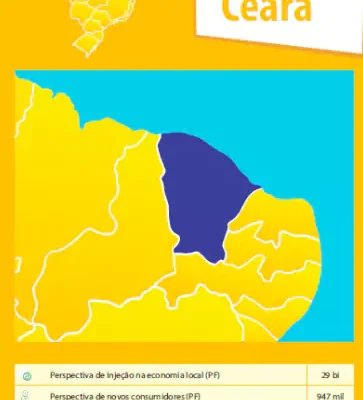Once the data from the Electricity distribution concessionaires, the Positive Registry can include up to 23 million Brazilians without access to the credit market.
Brasilia, August 18, 2020: State-owned and private electricity distribution companies will become part of the Positive Registry. The sector's membership will be formalized today through a memorandum of understanding signed between Marcos Madureira, president of the Brazilian Association of Electricity Distributors (ABRADEE), and the president of the National Association of Credit Bureaus (ANBC), Elias Sfeir.
ABRADEE brings together 41 electricity distribution concessionaires operating in all regions of the country, which together are responsible for serving 99.8% of Brazilian consumers. With this penetration electrical energy is one of the most universal public services, reaching more than 200 million people.
According to a study carried out by the credit bureau sector, the entry of information from electricity utilities into the Cadastro Positivo (Positive Registry) is essential to address the inclusion of approximately 23 million Brazilians, or 25% of the country's unbanked population, boosting the credit market. Although many people regularly pay their bills for ongoing services such as electricity, they are excluded from the credit market because they don't have enough information to make a credit assessment.
"The Cadastro Positivo should make the energy bill an even greater instrument of citizenship, in that the payment history of the energy bill will be included in the Central Bank's information database, allowing this data to be useful in granting loans and financial products. For many Brazilians, the citizen's bill will be the instrument for guaranteeing credit in the financial system," observes Marcos Madureira, president of the Brazilian Association of Electricity Distributors (ABRADEE).
The adhesion of the energy distributors comprises the third wave of information sharing with the credit bureaus that are operators of the Positive data (Boa Vista, Quod, Serasa and SPC). The first included financial institutions, followed by telecommunications companies.
The entry of distributors' data into the system will vary from one concessionaire to another and will depend on the individual timeframe according to each company's needs and systemic maturity for adapting security measures for sending and receiving data, from end to end. However, it is estimated that this process will take an average of six months.
"The basis of the Positive Registry is the information that will also make up the calculation of the credit rating, which takes into account payment habits and the relationship between companies and consumers with the market. The input of data from electricity distributors will expand and democratize the credit market, stimulating economic activity and bringing social welfare," says Elias Sfeir, president of ANBC.
"It's very difficult to find a credit market that works properly without a history of information about borrowers shared with all potential creditors. The Positive Registry brings secure information sharing, which, according to international experience, will make interest rates fall," said João Manoel Pinho de Mello, the director of Organization of the Financial System and Resolution at the Central Bank (BC).
"Sharing this information will help those people who don't have access to credit. Thousands of people in Brazil are still unbanked but pay their electricity bills on time. This information, by being included in the registers, helps to reduce the asymmetry of information and allows for the universalization of the granting of credit in a balanced and quality manner," commented the Central Bank's Director of Regulation, Otávio Damaso.

ANBC Press Relations
Regina Pimenta: (11) 98136.6835 regina@pimenta.com
Ana Carolina Rodrigues: (11) 98674.0348 anacarolina@pimenta.com



